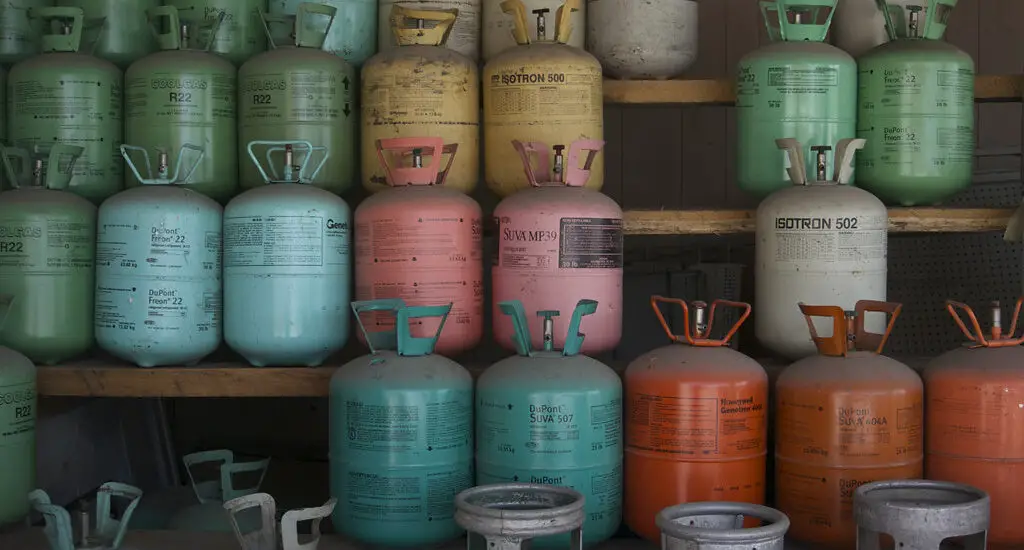Is it illegal to use Freon? If you’re looking for a detailed guide that clears up the legal landscape surrounding Freon usage, you’re in the right place. We’ll explore what Freon is, discuss its legal status, and delve into its environmental impact.

Table of Contents
Is It Illegal To Use Freon? The Current Laws
The legality surrounding the use of Freon varies based on the type and jurisdiction. In the United States, the Environmental Protection Agency (EPA) regulates Freon and other refrigerants through the Clean Air Act.
If you’re using R-22 (also known as HCFC-22), it is essential to know that it has been phased out and is highly restricted. Purchasing, handling, and even reclaiming R-22 now requires an EPA Section 608 certification. Failing to comply with these regulations could result in fines ranging from hundreds to thousands of dollars.
It’s worth noting that while the use of certain Freon types is restricted, it’s not universally “illegal” if already installed in existing systems. However, adding new R-22 to systems is limited to reclaimed or recycled R-22 and even that can only be handled by certified technicians.
If you’re using R-410A, which is an alternative to R-22, there are fewer restrictions, but regulations still require proper handling and disposal. Always consult with certified professionals when dealing with refrigerants.
Was Freon Banned?
The term “banned” is somewhat misleading. In the United States, certain types of Freon such as R-22 have been phased out rather than outright banned. This means you can’t produce or import new R-22, but existing supplies can still be used for maintenance and repair of existing systems by certified technicians.
The phasing out began in 2010 following international agreements like the Montreal Protocol, which aimed to protect the ozone layer by eliminating substances that contribute to ozone depletion.
Also, note that not all types of Freon have been phased out or restricted. Alternative refrigerants like R-410A are available and legal to use in new systems.
Which Freon Is Being Phased Out?
The primary Freon type being phased out is R-22 or HCFC-22. This refrigerant was a common component in residential air conditioning systems. The reason for the phase-out is its high ozone-depletion potential and significant contributions to climate change.
As part of the phase-out, production and import of R-22 ceased in the United States as of January 1, 2020. Existing supplies can still be used, but only by certified technicians.
Do ACs Still Use Freon?
Many older air conditioning systems still in operation use R-22. If you own such a unit, there’s no immediate legal obligation to replace it.
However, because of the phase-out, R-22 supplies are dwindling, and prices are rising. The newer air conditioning systems typically use R-410A, also known as Puron, which is more environmentally friendly and faces fewer legal restrictions.
If your system still uses R-22, consider consulting with an HVAC professional about replacing your unit or retrofitting it to use a more eco-friendly refrigerant. Doing this sooner rather than later could save you costs and legal hassles down the line.
Can You Still Buy Freon?
You can buy some types of Freon, but not all. For example, purchasing R-22 requires an EPA certification because of its phased-out status. Retailers should ask for this certification before selling it to you.
For other types like R-410A, no certification is required for purchase. Always remember that the sale of Freon is governed by various environmental laws, so ensure you are in compliance before attempting to buy any.
If you’re not a certified technician, you should not be handling certain types of Freon. In such cases, it’s advised to hire an EPA-certified technician for installation, repairs, or maintenance involving Freon.
Is Releasing Freon Illegal?
Yes, intentionally venting Freon into the atmosphere is illegal, regardless of the type of Freon. The Clean Air Act prohibits the release of refrigerants during the maintenance, service, repair, or disposal of air conditioning or refrigeration equipment.
This includes both ozone-depleting refrigerants like R-22 and non-ozone-depleting refrigerants like R-410A. Violating this law can result in severe financial penalties.
If you’re working with Freon, always adhere to EPA guidelines for the recovery and recycling of the material. Use EPA-certified recovery equipment and follow approved procedures for handling and disposing of Freon to avoid legal complications.